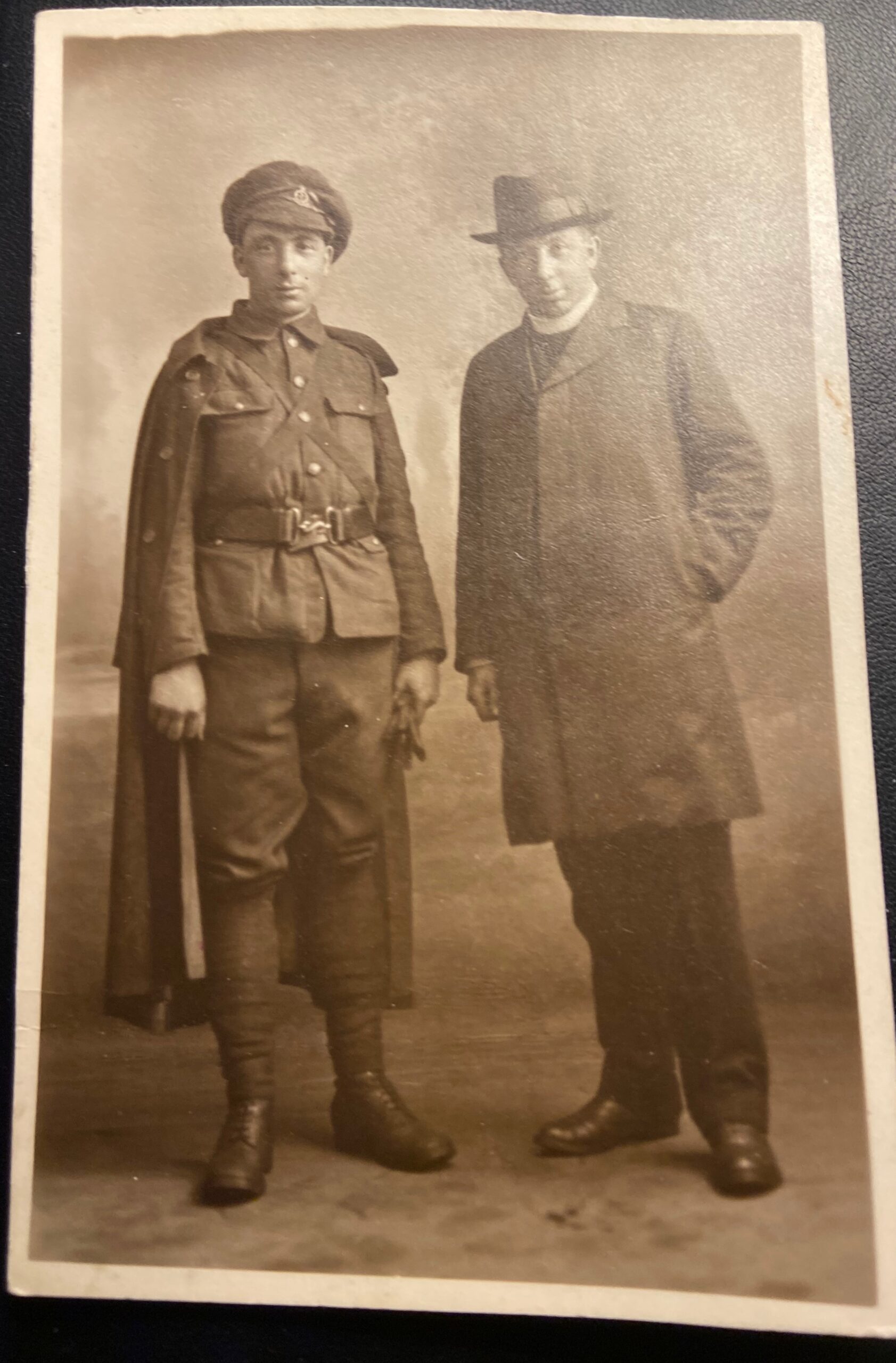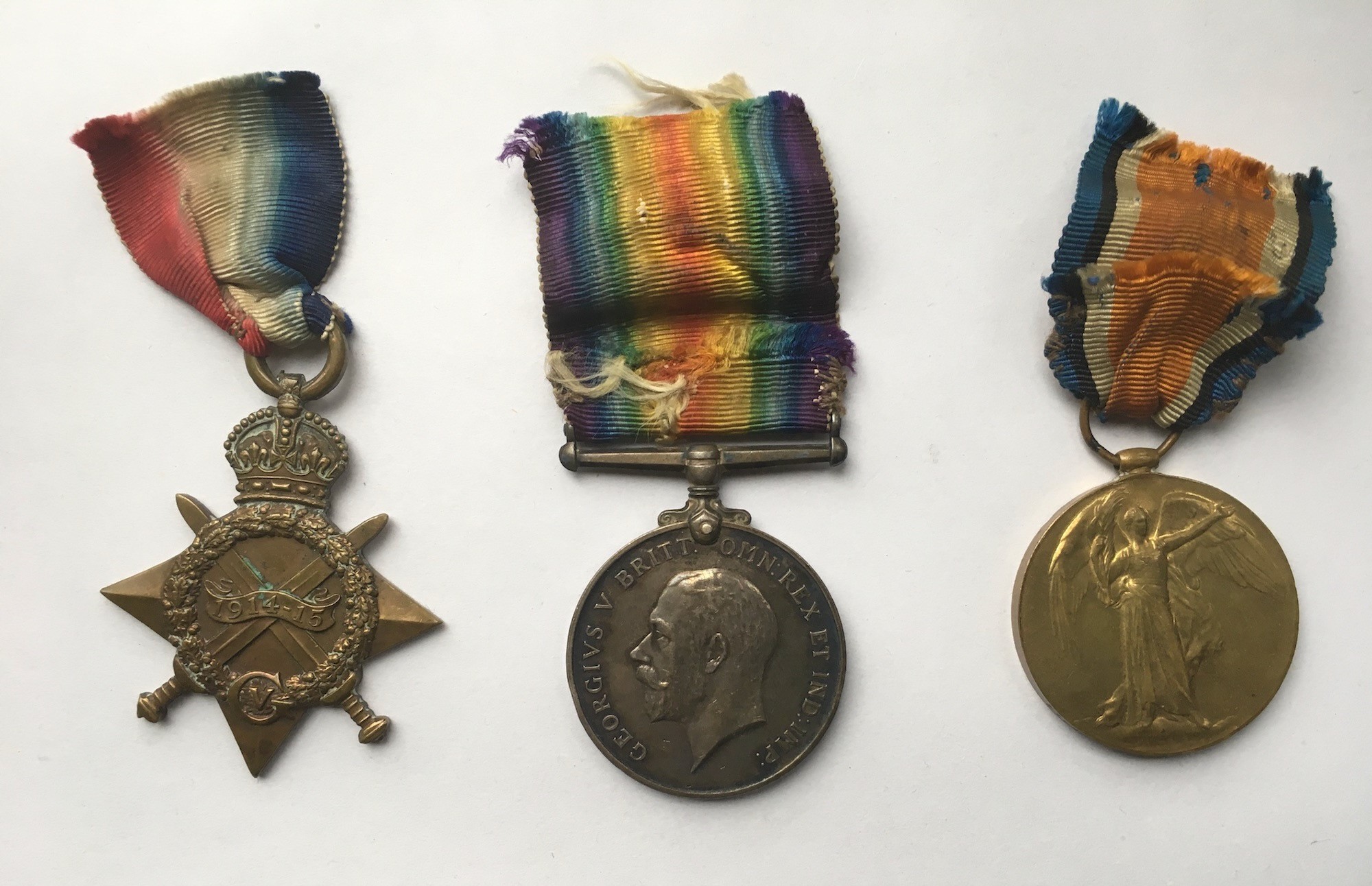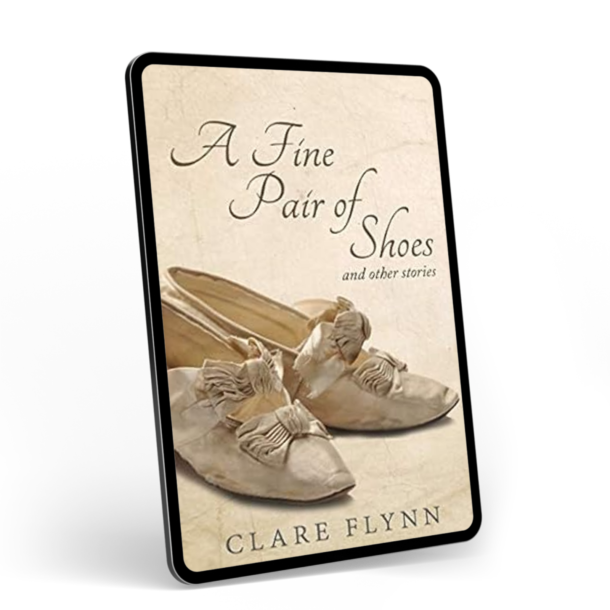Why The Artist’s War is dedicated to the grandfather I never met
Sadly, I never met either of my grandfathers – they both died in the 1930s when my parents were still children. My paternal grandfather, William Joseph Flynn served in the First World War on the Western Front, joining up in September 1914 as one of the Pals, and was demobbed in January 1919 from his last posting in Prussia, in time to marry my granny later that month. My granny believed his experiences during his years on the Western Front contributed to his early demise, when my father, the middle of five children, was just thirteen.
William (Bill) Flynn joined as an infantryman in September 1914, along with colleagues from the Liverpool Education Office. Soon after joining up, he was attached to the Royal Army Medical Corps (RAMC), serving as a private and eventually as a sergeant.
This image shows Bill with his older brother Thomas Edward Flynn, a Catholic priest and later to become the Bishop of Lancaster. My granny had written on the back of the photo Portsmouth 1914 so I imagine it was taken just before he embarked for France. He was twenty-four when he volunteered and engaged to be married to my granny, a nurse. They married immediately after he was demobbed in January 1919.

While several of his letters to his younger brother survive (also in the RAMC but serving at Salonika in the Balkans) only one, dated December 1918 from Prussia, is from his time as an enlisted man, so I have no information at all about what he did. His military attestation form offers no clues. His badges are the standard service ones. Here’s a brief extract from that letter:
I have reached a very good time since the armistice was signed, and I have reached my ambition so far as the war is concerned, viz:-to get into Germany. We arrived here a few days ago. It is quite a decent little town. It is reputed to be the smallest town–as distinct from villages–in Germany.
Our office comprises two rooms in the house of the local doctor. Two very nice rooms, each containing a stove, the fuel for which is provided by our hosts. I have a very good billet. I am with two other sergeants in a house near the office. We have good beds, with clean sheets and blankets. We never see the people; they live upstairs, apparently, but clean water is provided for use each day, and the frau makes the beds and cleans up the place after we leave in the morning. The language difficulty is very trying, but everyone is busy learning German.
Bill’s post-war letters reveal a man desperate to be a published author. He did a lot of public speaking, had strong political views and taught English Language at night school – a stickler for grammar and punctuation. While I have a couple of his short stories, he never had any accepted for publication. Evidently achieving publication was as tough back in the 1920s and 30s as it is today! I hope he’d be chuffed that one of his grandchildren has sixteen novels published in three languages. Here, in one of his letters to Fred he mentions his ambition:
What I WANT to do, and what I am attempting, have started, in fact is this: to write a series of, say, nine short stories for magazine publication, introducing an original character. I am half-way through the first of the series, and although my pen seems to be sufficiently facile, I am finding it very difficult to blend humour and exciting incident. It is not lack of words that I feel; I could go on writing all night, but–well, I’ll let you see my first attempt, when it is ready. When I say that I am half-way through it, I mean I am half-way through the first draft, which will, of course, need a great deal of revision, and it is not a bit like what I first intended it to be. I am thinking very seriously of taking a course under one of the Schools of Journalism, and have to-day written for prospectuses. I will keep you in touch with my movements; for I expect I shall want your advice–and continued encouragement.
I can’t begin to imagine how hard those years on the Western Front must have been for him. Apart from one rather whimsical short story set in Belgium, none of his writing relates to his war experience. Most of the stories are humorous – no doubt a way of coping with the horrors he must have witnessed.
I wish I knew exactly what Bill did in the RAMC. He could have been an orderly, an ambulance driver, a stretcher bearer or in charge of supplies. I like to think he was a stretcher bearer, as having read about their role on the Western Front, I think it required the most incredible bravery – and was dedicated to saving rather than taking lives. Whatever he did he gave up over four years of his life to serve.



The Artist’s War by Clare Flynn is the third in a wonderful series entitled Hearts of Glass. The series involves two upper crust British families whose focus on wealth and titles attempt to destroy any happiness that may cross the paths of their offspring. It covers time leading up to and including WWI. Although the main characters are very strong but human and lovable, Ms. Flynn has also brought to life colorful secondary characters whom you will not forget and will find yourself rooting for! I found the issues with the suffragettes very interesting and learned of another side of them. The description of the stained glass process was so fascinating and the pieces were so lovely I can’t help but wonder if Ms. Flynn delved into this a bit herself! Her description of WWI was devastating and I applaud the amount of research she must have done to accomplish these heartbreaking results. I also found it commendable that she tackled the issue of homosexuality and carried that through the series. I received an ARC copy of this book for an honest review. I had already read the first two books so would have read this regardless. Ms. Flynn is one of my favorite authors and I have read most of her series. I really enjoyed all three books in this series, however, this became my favorite as I was so emotionally invested in Alice, Victor, Edmund and the other characters. While Ms. Flynn seems to have wrapped up all loose ends, I am hoping she can add a fourth so I can revisit my favorites and find out how Charlotte, the youngest addition turns out! Thank you and kudos to you, Ms. Flynn!